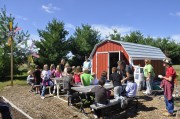Digging in the Dirt: Learning Gardens Produce Fresh-Food Lessons
Gardens prove to be effective tools for teaching kids and communities, MU researchers find
October 20th, 2010
Digging in the Dirt: Learning Gardens Produce Fresh-Food Lessons from MU News Bureau on Vimeo.
COLUMBIA, Mo. – Creative ideas are helping in the fight against child obesity. Recently, the White House offered cash awards to students who designed phone apps to promote exercise and nutrition; in Boston, researchers graded recess games in terms of students’ energy use and enjoyment. In Missouri, parents, teachers and kids are rolling up their sleeves to reap the benefits of growing gardens. As part of the University of Missouri Healthy Lifestyle Initiative, learning gardens are proving to be powerful tools for educating people about fresh, healthy foods.

At the Southern Boone Learning Garden, students participate in hands-on lessons that connect food, health and the environment.
Concern about national child health issues – obesity, behavior problems, diabetes – prompted two mothers to launch the Southern Boone County (SoBoCo) Learning Garden. The garden serves nearly 650 pre-K-5th grade students through classroom-linked lessons and activities and an after-school gardening club.
“Children need more opportunities to experience fresh air and the outdoors,” said Lesli Moylan, director of the SoBoCo learning garden. “The learning garden teaches them the benefits of fresh food, eating healthy and being environmentally conscious. The kids respond enthusiastically to the lessons and teachers enjoy the learning opportunities provided by having a garden at the school. They’ve seen positive behavior changes in students.”
MU researchers have implemented a variety of fresh-food programs in schools and communities. They found that students learn best through engaging, hands-on lessons, such as planting gardens and visiting local farms. These programs, such as Farm to Cafeteria and Harvest of the Month, have proven effective in teaching students about growing, preparing and eating fresh foods. Many programs target elementary schools with the idea that changing children’s eating behaviors can lead to lifelong health and wellness.
Several learning gardens, farmers markets and healthy food initiatives are part of the HLI Grow Healthy Columbia/Boone County Partnership. MU grow healthy leaders encourage collaboration, sharing resources and information, to ensure all residents have access to healthy, locally grown food. Partnerships are proving beneficial in urban areas, including Kansas City and St. Louis.
“Many people are passionate about increasing access to locally grown foods, but we found that most of them don’t know one another,” said Vera Massey, MU Extension education specialist and project coordinator for Boone County. “The Grow Healthy Partnership has enhanced communication among those individuals to increase collaborative projects and mobilize groups. This ultimately will assist in creating long-term environmental and policy change.”
The Healthy Lifestyle Initiative, underway in 13 Missouri counties, is aimed at changing environments to increase the availability of affordable, locally produced foods and access to safe physical activities. HLI is a collaborative effort of the MU Extension program areas: Agriculture & Natural Resources, Business Development, 4-H/Youth Development, Community Development, Human Environmental Sciences and Continuing Education.
For more information, please visit: http://extension.missouri.edu/healthylife/index.htm

